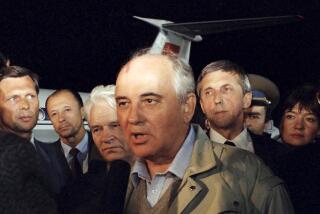Gorbachevâs New Strength
Last weekâs Central Committee plenum in Moscow was a crucial test of General Secretary Mikhail S. Gorbachevâs control of the Communist Party apparatus. The meetings presented an even more serious challenge to Gorbachevâs reform plans, which have been repeatedly called âradicalâ and âdrastic.â But, to the mild surprise of Sovietologists, Gorbachev emerged from the plenum with renewed stature. While undoubtedly gained at much cost, his new strength will force new priorities not only on his nation but on the United States as well.
Many will acknowledge, but few can describe in detail, the power struggle that Gorbachev has endured over the past few days. That he left the plenum with hardly a scratch, however, casts real doubt on the presumed weakness with which he entered the session. In spite of the considerable obstacles still confronting his reforms, Gorbachev now seems to have the requisite power structure to implement changes previously unimagined in the Soviet pantheon of reform efforts. This means that this country must change its estimate of Gorbachevâs control over the Soviet economy.
Such a position, and its pitfalls, is familiar to the history of Kremlin politics. Nikita S. Khrushchevâs demise hinged on his marriage to a set of unworkable âharebrained schemes.â But Gorbachev learned from Khrushchevâs mistakes. And, like no Soviet leader before him, Gorbachev seems to appreciate the intricate and interdependent nature of the Soviet economy. His reform strategy relaxes Moscowâs control over industrial management, but does not leave those managers adrift without the guidance of a central plan.
Gorbachevâs ideas will still inspire controversy throughout the Soviet system. But as the Soviet leaders decide the future of their nation, so must the United States choose a response to Gorbachevâs initiatives. Although it is almost impossible to dictate Soviet behavior from abroad, Americaâs reaction to Gorbachevâs actions will register in the Kremlin. This country may face either a reinvigorated Soviet Union or one newly plunged into internal instability. To a small extent it can choose between the two. Does the United States want to see Gorbachevâs overhaul of the Soviet economy succeed? Already the idea of a convertible Soviet currency is no longer unthinkable. And recent joint-venture legislation provides a largely untested but seemingly viable channel for Soviet interests in the world economy. Can the United States do battle with a newly strong Soviet Union on both economic and military fronts? More interestingly, will one front eventually supersede the other? Indeed, either the success or the failure of Gorbachevâs tenure will force America to make choices.
New personalities and a new program do not a new nation make. But to Gorbachevâs advantage, his ârevolutionâ seems not to originate solely from above or below. Washington should not underestimate his task, but neither should it underestimate his resources.
More to Read
Sign up for Essential California
The most important California stories and recommendations in your inbox every morning.
You may occasionally receive promotional content from the Los Angeles Times.










